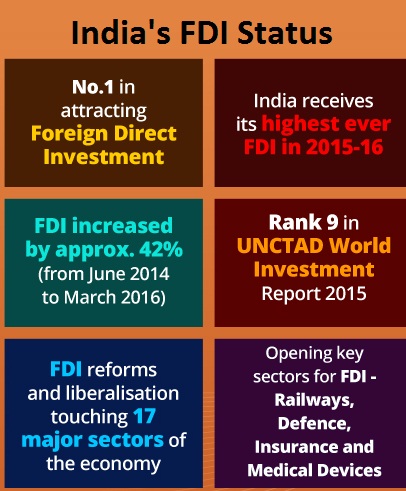Indian Economy
Review of FDI Norms
This article is based on “Resetting balance”, “India is right to impose barriers on China. But there is a price tag”, “Boost, not restrict, foreign investment”. It talks about the implications of a recent change in FDI norms for India economy.
Recently, India has revised its FDI rules amid the Covid-19 pandemic. Under the revised norms, the automatic route is now closed to investors from India’s land neighbours, with special reference to China.
This new regulation is based on the fear that China may take advantage of the rock-bottom valuations of the firms of national importance in the backdrop of the lockdown. For example, recently People’s Bank of China purchased shares of HDFC Bank at a very low price.
However, India is facing a dilemma on this front, as the foreign capital remains crucial to the country’s economic success, and will be doubly important as India tries to revive its economy.
Thus, India needs to balance between its economic needs and combating neo-imperialist tendencies of China.
Note:
Revised FDI Rules
- Companies in any country that shares a border with India will have to approach the government for investing in India and not go via the automatic route.
Automatic Route
- Under the Automatic route, companies only need to inform the authorities after the investment is made
Government Approval route
- As per the Government route, prior approval is mandatory before investment.
Neo-Imperialism
- It is the new wave of imperialism reflected by use of power and economic influence to dominate smaller countries.
- Modern imperialistic practices like the economic desire for new resources and markets, and a "civilizing mission" ethos can be termed as neo-imperialist strategies.
Neo-Imperialist Trade Practices of China
The overt objective of revision of this FDI policy, is to guard against “opportunistic takeovers and acquisitions” of Indian companies brought about by low valuations amidst the Covid-19 pandemic. However, India is also apprehensive about Chinese investment on the following accounts:
- China has alleged by both the developing and developed world of its efforts to control infrastructural, industrial and technological assets in these countries. Thereby, seeking to have a strategic advantage through economic interdependence.
- Ever since China became central to global supply chains, it has used perverse industrial tools to climb the value chain, exacerbate trade imbalances and undermine global competition.
- For example, cheap imports backed by China's state capitalism have undermined India’s manufacturing sector and led to a massive trade deficit..
- China has also blocked market access to Indian companies in pharmaceuticals, dairy products and IT services.
- This unfavourable balance of trade was one of the main reasons for India to walk out of the RCEP negotiations.
State Capitalism
- The heads of the major companies become subordinate government agencies.
- Through forceful control of the state, worker organizations are robbed of their rights to the representation of their interests and forcibly incorporated into the planned system.
- China is using the Digital Silk Road, a subset of the Belt and Road Initiative (BRI) to enhance digital connectivity abroad, extend its influence, and further China’s ascendance as a technological superpower.
- China has been able to do this by monopolising strategic industrial technology through the ‘Made in China 2025’ initiative. One such example of this technology can be stated as 5G.
- In the past few years, Chinese investors have had big stakes in 18 of India’s 23 unicorns (startups with over $1 billion). For example, Ola, PayTM, Byju’s etc.
- This will hamper the prospect of Indian unicorns becoming global giants like Amazon, Uber etc.
Significance of Chinese Investments
- Greater FDI is welcome, especially during the economic slowdown and China has been the fastest-growing source of foreign investment in the last five years.
- If India is to make its way to a $5 trillion economy by 2025, it may find it difficult to do so without a more robust trade and investment relationship with China.
- FDI from China will help in mitigating the growing disadvantage against trade deficit with China.
- The recent changes in FDI norms would be a setback to India’s decades-long attempt to be more attractive to investors from all countries.
Way Forward
- The Department of Promotion of Industry and Internal trade should work out a clear process and precise regulations to decide what is an acceptable investment.
- India should welcome investment in enhancing the country’s productive capacity regardless of where it comes from, except, of course, in sectors where control of that production capacity has a bearing on national security.
- There is a need for India to develop new legal and institutional tools. As the ones employed by US and EU member states such as data protection laws or revised mergers and acquisitions rules, and institutional bodies.
- Without the appropriate legal and regulatory sanction, India might experience reciprocal measures.
- In order to protect India’s unicorn, there is need to devise a scheme of preferential or special shares which a unicorn can issue to foriegn investor.
- These shares will preserve the decision making by Indian innovators, while also providing them access to foreign capital.
At this crucial juncture of economics, where the world is witnessing another economic crisis, India needs to expand its overseas economic engagements, even while remaining sensitive to its overall economic sustainability needs.
|
Drishti Mains Question India needs to balance between its economic needs and combating neo-imperialist tendencies of China. Critically Analyse. |
Follow editorial analysis on our youtube channel. This editorial is based on Institutional fixes and the need for ethical politics, published in The Hindu on April 18, 2020.





